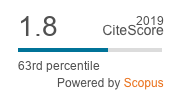The impact of personal interactions on the stress of school administrators: The validation and application of an assessment tool
Abstract
Purpose: To analyze personal interactions as one of the possible factors that can generate greater stress in school administrators. For this purpose, we present the design, validation and application of a survey that intends to measure the type of managerial functions that are associated with higher rates of personal interaction and their possible measurement as stressors of those performing administrative functions.
Design/methodology/approach: To develop, validate and apply an assessment tool to measure the stress of school administrators. To this end, a mixed analysis methodology has been adopted, involving the selection of a group of experts, the calculation of an “expert proficiency coefficient” (Cabero & Barroso, 2013) and the subsequent validation of the survey using the modified Delphi method in two phases, with a sample of 30 school administrators and educational supervisors. The survey has also been subjected to a process to determine the trustworthiness and validity of the construct through exploratory and confirmatory factor analysis.
Findings: The result is a 5-dimension, 31-item survey with a total score of 155 points and three measurements: low stress (1-50 points), medium stress (51-100 points) and high stress (101-155 points). The areas that generate the greatest amount of stress can be summarized in two categories: reprimanding teachers for non-performance of their duties and discipline management at the center (expulsions, bullying, fighting and drugs).
Research limitations/implications: The survey was designed according to the socio-educational characteristics of the Spanish context. Further research in other educational contexts would require an adaptation of different items on the scale.
Practical implications: Measuring the school administrator’s stress makes it possible to identify those functions that are more susceptible to intervention, both formative and administrative. This improves one of the key areas of school organization.
Social implications: The improvement of the school institution and its governance starts with identifying those aspects that require educational interventions, but also social ones that imply a reflection on how schools in the 21st century are managed and organized.
Originality/value: There are no Spanish studies that propose assessment tools to measure the stress of school administrators; in this sense, this study provides a framework for the Spanish context.
Keywords
DOI: https://doi.org/10.3926/ic.993
This work is licensed under a Creative Commons Attribution 4.0 International License
Intangible Capital, 2004-2024
Online ISSN: 1697-9818; Print ISSN: 2014-3214; DL: B-33375-2004
Publisher: OmniaScience








